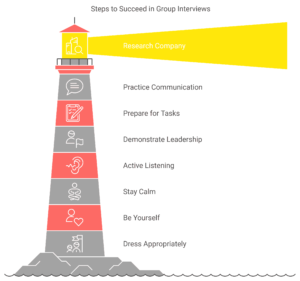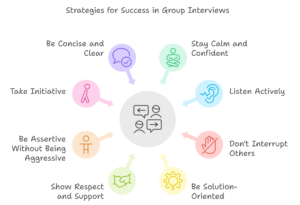Job interviews come in many formats, but one increasingly popular approach is the group interview. As businesses grow and competition for roles intensifies, employers often opt for group interviews to assess how candidates interact in a team setting. This format not only evaluates individual skills but also focuses on how candidates communicate, collaborate, and fit into the company culture.
But what exactly is a group interview, and how can you stand out from the crowd? Whether you’re preparing for a group interview for a content writer position or another role, understanding the process and the best strategies to succeed can make a significant difference. In this post, we’ll explore everything you need to know about group interviews, from the definition to the advantages and disadvantages, as well as tips for acing the interview and examples of what works.
What is a Group Interview?
A group interview is a type of job interview where multiple candidates are interviewed simultaneously, typically in a group setting. The employer or hiring panel observes how candidates interact with each other, how they present themselves, and how well they collaborate in discussions and tasks. Group interviews are often used for roles that require teamwork, communication, and interpersonal skills, such as customer service, marketing, content writing, and sales.
In a group interview, candidates are generally given individual or group tasks and are observed on how they handle the challenge. These interviews are common in larger companies or organizations with high volumes of applicants, as they allow employers to assess many candidates at once.
Advantages and Disadvantages of Group Interviews
Advantages of Group Interviews
- Efficiency: Group interviews allow employers to assess multiple candidates at once, saving time and resources.
- Assessing Interpersonal Skills: Employers can observe how candidates communicate, collaborate, and resolve conflicts in a group setting.
- Evaluating Team Dynamics: Group interviews help employers gauge how well candidates work as a team, which is critical for roles that involve group collaboration.
- Less Pressure: For some candidates, the presence of others can reduce the pressure that comes with one-on-one interviews.
- Highlighting Leadership Potential: In a group interview, candidates can naturally demonstrate their leadership skills and ability to take charge in group settings.
Disadvantages of Group Interviews
- Limited Personal Interaction: With multiple candidates, it can be challenging for an interviewer to get to know each candidate deeply.
- Competitive Atmosphere: The presence of other candidates may create a competitive or intimidating atmosphere that could make it difficult for some to express themselves confidently.
- Group Dynamics: Some candidates may dominate the conversation, while others may struggle to contribute, which could affect how the group interview is perceived.
- Not Suitable for All Roles: Group interviews may not be suitable for roles that require deep one-on-one interactions or complex problem-solving skills.
- Increased Stress: Candidates who prefer individual attention may find group interviews more stressful, as they have to compete with others for attention and focus.
Group Interview Process
Group interviews can be challenging, but with the right strategies, you can shine and stand out from the competition. Below are several bonus tips that will help you navigate a group interview successfully, demonstrating both your skills and your ability to collaborate with others.
1. Stay Calm and Confident
One of the key factors that interviewers look for in a group setting is how well you handle stress and pressure. Staying calm and composed, even when the interview environment is hectic, will make a lasting impression. Confidence doesn’t mean dominating the conversation; it’s about showing that you can remain self-assured without coming across as arrogant. Use positive body language, such as making eye contact and smiling, and speak clearly to convey your thoughts. When you’re nervous, it’s easy to rush through your words, but speaking deliberately will allow you to express yourself better.
2. Listen Actively
Active listening is an important skill in a group interview. Instead of focusing solely on what you want to say next, give full attention to your fellow candidates’ responses and the interviewer’s questions. Nod in acknowledgment, ask follow-up questions when appropriate, and build on others’ ideas. This not only shows respect but also highlights your ability to work in a collaborative setting. Active listening demonstrates that you value others’ contributions and are open to different perspectives.
3. Don’t Interrupt Others
In a group interview, multiple candidates will want to speak, and it’s important to wait your turn. Interrupting others can come off as disrespectful and can create a negative impression. If you feel strongly about adding something to the conversation, wait for a natural pause. Respecting others’ speaking time will reflect well on your professionalism and ability to be part of a team.
4. Be Solution-Oriented
Group interviews often include problem-solving exercises, where candidates need to collaborate and find solutions to a given scenario. In these situations, focus on offering practical and thoughtful solutions rather than dwelling on the problems. Employers are looking for candidates who are proactive and capable of thinking critically under pressure. Instead of pointing out what’s wrong, try to suggest ways to move forward or offer creative solutions. This will not only highlight your problem-solving skills but also your ability to stay positive and productive in challenging situations.
5. Show Respect and Support for Others
While you want to stand out, it’s important to be mindful of how you interact with your fellow candidates. Show respect for their ideas and contributions. If someone else makes a good point, acknowledge it or build on it, showing that you value teamwork and collaboration. This approach will not only make you appear more personable and cooperative but also demonstrate that you can thrive in a team-oriented environment, a quality that employers often seek in candidates.
6. Be Assertive Without Being Aggressive
Assertiveness is key to making yourself heard in a group interview, but it’s important to avoid coming across as overly aggressive. Express your ideas clearly and confidently, but don’t overpower others. When you speak, make sure your tone is respectful and that you’re adding value to the conversation. Assertiveness in a group interview means advocating for your ideas without disregarding or overshadowing others. It shows that you can be a leader when necessary but also work harmoniously within a team.
7. Take Initiative
In many group interviews, candidates are given tasks that require leadership and initiative. If a task needs someone to step up and lead, be the one to volunteer. Offering to take the lead or to coordinate group activities shows that you are proactive, can take responsibility, and are comfortable in leadership roles. Even if you’re not officially the leader, contribute ideas, offer guidance when needed, and ensure the task moves forward efficiently.
8. Be Concise and Clear
In a group interview, time is often limited, and you’ll need to communicate your points clearly and concisely. Avoid rambling or over-explaining your thoughts. Instead, make sure your responses are direct and to the point. This not only demonstrates your communication skills but also reflects your ability to be clear and organized, which are essential qualities for any role. Use bullet points in your answers, if applicable, and stay focused on the main idea without veering off-topic.
9. Demonstrate Your Adaptability
Adaptability is highly valued in group interviews, especially when candidates are asked to work together on a task or problem. During the interview, be flexible in your approach to the activities. If someone else suggests a different direction or method, show that you are open to new ideas and willing to adjust your approach. Adaptability demonstrates that you can work in dynamic environments and are willing to compromise when necessary to reach a goal.
10. Follow Up with a Thoughtful Thank-You Note
After the group interview, send a personalized thank-you note to express your gratitude for the opportunity. This may seem like a small detail, but it’s an effective way to reinforce your interest in the role and leave a positive impression. In your thank-you message, you can briefly mention something from the interview that resonated with you or reiterate how your skills align with the role, showing that you were engaged and attentive throughout the process.
How to Prepare for a Group Interview
Preparing for a group interview involves both individual preparation and strategies to succeed in a group setting. Here are some tips:

- Research the Company: Understand the company’s culture, values, and the job role you are applying for. This allows you to tailor your answers to align with the company’s goals and needs.
- Practice Communication Skills: Since group interviews are highly interactive, practice your communication skills. Work on speaking, listening actively, and contributing thoughtfully to discussions.
- Prepare for Group Tasks: Familiarize yourself with common group interview exercises, such as brainstorming sessions, problem-solving tasks, or collaborative activities.
- Demonstrate Leadership: While it’s important to collaborate, don’t be afraid to take the lead in discussions. Show that you can steer the conversation, propose ideas, and handle responsibility.
- Be an Active Listener: Pay attention to what others are saying and acknowledge their points. Being a good listener is a key skill in any team environment.
- Stay Calm Under Pressure: Group interviews can be intensified. Stay calm, even when you feel nervous. Take deep breaths and focus on contributing meaningfully to the group.
- Be Yourself: Authenticity goes a long way in group interviews. Don’t try to be someone you’re not. Be yourself, but also be professional.
- Stand Out Without Dominating: It’s important to make a positive impression without overshadowing others. Find a balance between contributing and allowing others to speak.
- Prepare Your Questions: At the end of the interview, you are sometimes asked if you have any questions. Have a few insightful questions ready about the company, role, or team dynamics.
- Dress Appropriately: Like any interview, your appearance matters. Dress professionally, keeping in mind the company culture and the nature of the role.
Bonus Tips for Success in Group Interviews
Group interviews can be challenging, but with the right strategies, you can shine and stand out from the competition. Below are several bonus tips that will help you navigate a group interview successfully, demonstrating both your skills and your ability to collaborate with others.

1. Stay Calm and Confident
One of the key factors that interviewers look for in a group setting is how well you handle stress and pressure. Staying calm and composed, even when the interview environment is hectic, will make a lasting impression. Confidence doesn’t mean dominating the conversation; it’s about showing that you can remain self-assured without coming across as arrogant. Use positive body language, such as making eye contact and smiling, and speak clearly to convey your thoughts. When you’re nervous, it’s easy to rush through your words, but speaking deliberately will allow you to express yourself better.
2. Listen Actively
Active listening is a crucial skill in a group interview. Instead of focusing solely on what you want to say next, give full attention to your fellow candidates’ responses and the interviewer’s questions. Nod in acknowledgment, ask follow-up questions when appropriate, and build on others’ ideas. This not only shows respect but also highlights your ability to work in a collaborative setting. Active listening demonstrates that you value others’ contributions and are open to different perspectives.
3. Don’t Interrupt Others
In a group interview, multiple candidates will want to speak, and it’s important to wait your turn. Interrupting others can come off as disrespectful and can create a negative impression. If you feel strongly about adding something to the conversation, wait for a natural pause. Respecting others’ speaking time will reflect well on your professionalism and ability to be part of a team.
4. Be Solution-Oriented
Group interviews often include problem-solving exercises, where candidates need to collaborate and find solutions to a given scenario. In these situations, focus on offering practical and thoughtful solutions rather than dwelling on the problems. Employers are looking for candidates who are proactive and capable of thinking critically under pressure. Instead of pointing out what’s wrong, try to suggest ways to move forward or offer creative solutions. This will not only highlight your problem-solving skills but also your ability to stay positive and productive in challenging situations.
5. Show Respect and Support for Others
While you want to stand out, it’s important to be mindful of how you interact with your fellow candidates. Show respect for their ideas and contributions. If someone else makes a good point, acknowledge it or build on it, showing that you value teamwork and collaboration. This approach will not only make you appear more personable and cooperative but also demonstrate that you can thrive in a team-oriented environment, a quality that employers often seek in candidates.
6. Be Assertive Without Being Aggressive
Assertiveness is key to making yourself heard in a group interview, but it’s important to avoid coming across as overly aggressive. Express your ideas clearly and confidently, but don’t overpower others. When you speak, make sure your tone is respectful and that you’re adding value to the conversation. Assertiveness in a group interview means advocating for your own ideas without disregarding or overshadowing others. It shows that you can be a leader when necessary but also work harmoniously within a team.
7. Take Initiative
In many group interviews, candidates are given tasks that require leadership and initiative. If a task needs someone to step up and lead, be the one to volunteer. Offering to take the lead or to coordinate group activities shows that you are proactive, can take responsibility, and are comfortable in leadership roles. Even if you’re not officially the leader, contribute ideas, offer guidance when needed, and ensure the task moves forward efficiently.
8. Be Concise and Clear
In a group interview, time is often limited, and you’ll need to communicate your points clearly and concisely. Avoid rambling or over-explaining your thoughts. Instead, make sure your responses are direct and to the point. This not only demonstrates your communication skills but also reflects your ability to be clear and organized, which are essential qualities for any role. Use bullet points in your answers, if applicable, and stay focused on the main idea without veering off-topic.
9. Demonstrate Your Adaptability
Adaptability is highly valued in group interviews, especially when candidates are asked to work together on a task or problem. During the interview, be flexible in your approach to the activities. If someone else suggests a different direction or method, show that you are open to new ideas and willing to adjust your approach. Adaptability demonstrates that you can work in dynamic environments and are willing to compromise when necessary to reach a goal.
10. Follow Up with a Thoughtful Thank-You Note
After the group interview, send a personalized thank-you note to express your gratitude for the opportunity. This may seem like a small detail, but it’s an effective way to reinforce your interest in the role and leave a positive impression. In your thank-you message, you can briefly mention something from the interview that resonated with you or reiterate how your skills align with the role, showing that you were engaged and attentive throughout the process.
Final Thoughts
Success in a group interview doesn’t solely depend on what you know—it also depends on how you present yourself and interact with others. Employers are looking for candidates who can collaborate, listen, and contribute effectively in team environments. By incorporating these bonus tips into your group interview preparation, you can confidently showcase your strengths while also proving that you can thrive in a dynamic, group-oriented setting.
Wrapping up
Group interviews can be both exciting and nerve-wracking, but with the right preparation and mindset, you can make a lasting impression. Whether you’re interviewing for a content writer position or another role, mastering the art of group interviews is a valuable skill that can help you stand out in competitive job markets. By understanding the group interview process, preparing thoughtfully, and demonstrating strong interpersonal skills, you can set yourself up for success.
By following the tips and strategies shared in this post, you’ll be well-equipped to succeed in your next group interview and secure the job you want.
FAQs
- What should I wear to a group interview?
Dress professionally, keeping in mind the company’s culture. A business casual look is often a safe choice, but for more formal industries, opt for formal attire. - How many people are typically in a group interview?
Group interviews usually involve around 3-10 candidates, but the number can vary depending on the company and the position. - How do I stand out in a group interview?
Contribute to the discussion, demonstrate leadership without overshadowing others, and showcase your communication and teamwork skills. - Can I prepare for a group interview?
Yes, practice by researching common group tasks, improving your communication skills, and learning about the company and role. - What types of jobs use group interviews?
Group interviews are common for roles that require teamwork and strong interpersonal skills, such as customer service, sales, marketing, and content writing.
